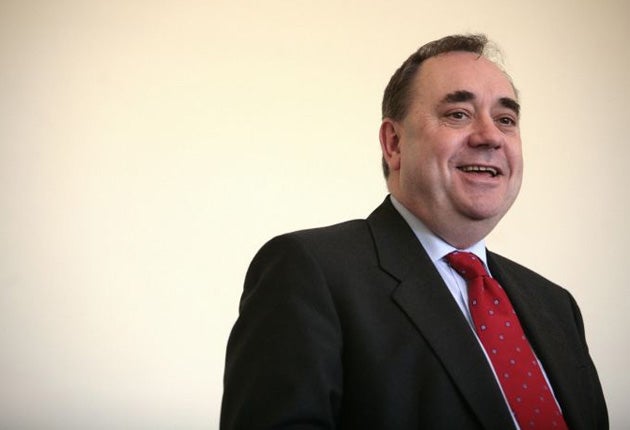SNP criticised over 'independence lite' plans for Scotland
White Paper to offer Scots more powers within the UK as appetite for complete separation wanes

Alex Salmond will tomorrow attempt to shore up support for more Scottish self-determination with a "devolution max" package of proposals offering Scots more powers – but within the United Kingdom.
The Scottish First Minister will respond – appropriately enough, perhaps, on St Andrew's Day – to a recent slump in support for independence with a "historic" document setting out plans to give the people of Scotland a vote on their constitutional future.
But while the White Paper will make the case for independence, it will also lay out the possibility of Scotland gaining more powers from Westminster and remaining part of the UK.
The scaled-down plans for a referendum bill will be published only days after an opinion showing that fewer than one in three people said they would vote "yes" to independence. More than half said they would vote against independence, raising SNP fears that the party was vulnerable to attack from a resurgent Labour Party in the run-up to the general election.
Under Mr Salmond's package – dubbed "independence lite" by critics – Scotland would be granted control over everything other than defence, foreign policy and overarching economic policy. The country would retain the Queen as head of state, the pound as its currency and its traditional relationship with the British Army.
But the compromise has already attracted fierce criticism from SNP sympathisers, and the veteran nationalist Margo MacDonald. The independent MSP, a life-long supporter of Scottish independence, attacked the SNP's flagship plan to hold an independence referendum as "half baked". She claimed she would vote for the forthcoming bill only through "gritted teeth".
"I will hate the referendum bill because the strategy and tactics which have gone along with it have been so wrong," Ms MacDonald said. "The SNP have failed to make the case for independence. I will have to vote for the bill because presented with a choice between giving the Scottish people a say or giving them no say, I will have to back it. But I hate it and I will say why I hate it."
Labour attempted to steal a march on the nationalists last week, with a "new deal" for devolution promising to give the Holyrood Parliament new tax-raising powers. The plan presented by the Scottish Secretary, Jim Murphy, aimed to keep Scotland in the Union, but with extended powers over areas including tax-raising, speeding and policing drink-drivers.
Mr Murphy said the Government would adopt almost all of the recommendations of the Calman Commission, set up last year by pro-Union parties to examine how to strengthen devolution.
The SNP's White Paper will lay out a range of options for governing Scotland, from the status quo to full independence. Mr Salmond will argue that the SNP has the "initiative on the constitutional debate".
A spokesman for the First Minister dismissed Ms MacDonald's criticism of its tactics in making the case for independence, arguing that the National Conversation was highly effective. He added: "For all those who want more powers than we have, this is the process by which to achieve it."
Only 29 per cent of voters said they would support the Holyrood administration if it tried to negotiate a settlement with the UK Government enabling Scotland to become an independent state. The figure was down from 31 per cent in October 2008. But 57 per cent said they would vote no, up four points from the poll last October.
When questioned on their voting intentions at a general election, 39 per cent said they would back Labour, up on the 29 per cent support the party had in August 2008. Support for the SNP was 24 per cent, up from the 18 per cent they polled in the last election, but down from August 2008, when backing was as high as was 36 per cent.
Join our commenting forum
Join thought-provoking conversations, follow other Independent readers and see their replies
Comments
Bookmark popover
Removed from bookmarks